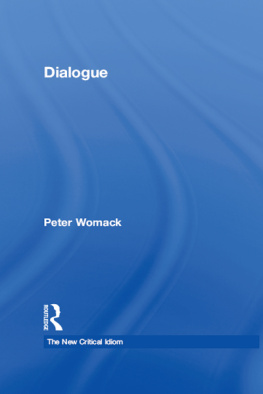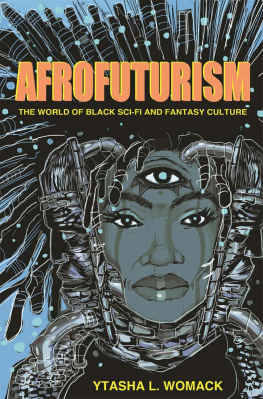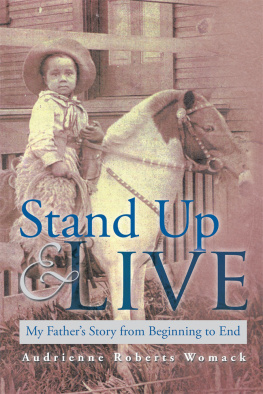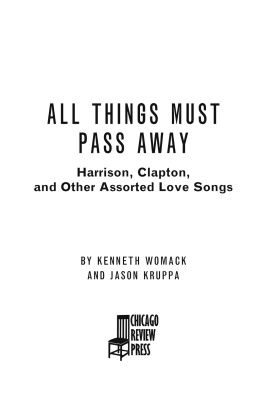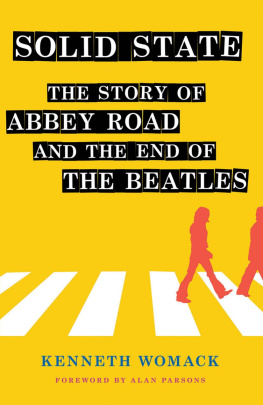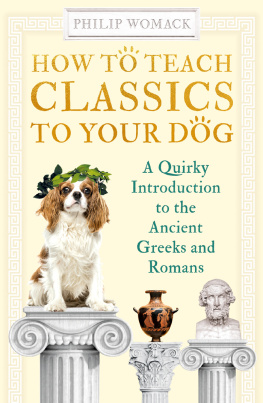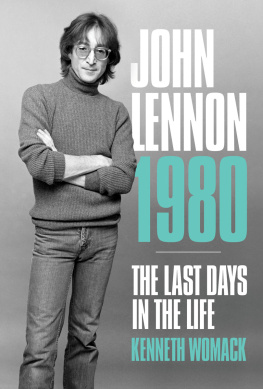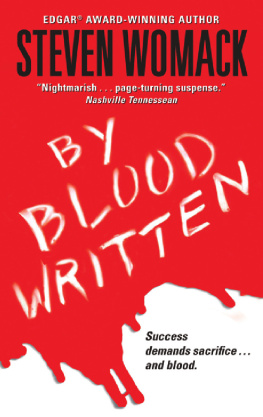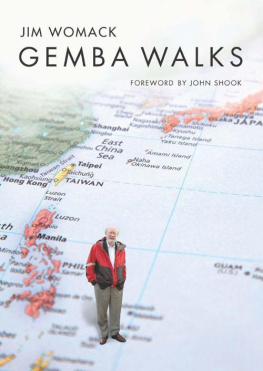Womack - Dialogue
Here you can read online Womack - Dialogue full text of the book (entire story) in english for free. Download pdf and epub, get meaning, cover and reviews about this ebook. City: London, year: 2011, publisher: Routledge, genre: Religion. Description of the work, (preface) as well as reviews are available. Best literature library LitArk.com created for fans of good reading and offers a wide selection of genres:
Romance novel
Science fiction
Adventure
Detective
Science
History
Home and family
Prose
Art
Politics
Computer
Non-fiction
Religion
Business
Children
Humor
Choose a favorite category and find really read worthwhile books. Enjoy immersion in the world of imagination, feel the emotions of the characters or learn something new for yourself, make an fascinating discovery.
Dialogue: summary, description and annotation
We offer to read an annotation, description, summary or preface (depends on what the author of the book "Dialogue" wrote himself). If you haven't found the necessary information about the book — write in the comments, we will try to find it.
Womack: author's other books
Who wrote Dialogue? Find out the surname, the name of the author of the book and a list of all author's works by series.
Dialogue — read online for free the complete book (whole text) full work
Below is the text of the book, divided by pages. System saving the place of the last page read, allows you to conveniently read the book "Dialogue" online for free, without having to search again every time where you left off. Put a bookmark, and you can go to the page where you finished reading at any time.
Font size:
Interval:
Bookmark:

DIALOGUE
Dialogue is a many-sided critical concept; at once an ancient philosophical genre, a formal component of fiction and drama, a model for the relationship of writer and reader, and a theoretical key to the nature of language. In all its forms, it questions literature, disturbing the singleness and fixity of the written text with the fluid interactivity of conversation.
In this clear and concise guide to the multiple significance of the term, Peter Womack:
outlines the history of dialogue form, looking at Platonic, Renaissance, Enlightenment and Modern examples;
illustrates the play of dialogue in the many voices of the novel, and considers how dialogue works on the stage;
interprets the influential dialogic theories of Mikhail Bakhtin;
examines the idea that literary study itself consists of a dialogue with the past;
presents a useful glossary and further reading section.
Practical and thought-provoking, this volume is the ideal starting-point for the exploration of this diverse and fascinating literary form.
Peter Womack is Professor of Literature and Drama at the University of East Anglia.
SERIES EDITOR: JOHN DRAKAKIS, UNIVERSITY OF STIRLING
The New Critical Idiom is an invaluable series of introductory guides to today's critical terminology. Each book:
provides a handy, explanatory guide to the use (and abuse) of the term;
offers an original and distinctive overview by a leading literary and cultural critic;
relates the term to the larger field of cultural representation.
With a strong emphasis on clarity, lively debate and the widest possible breadth of examples, The New Critical Idiom is an indispensable approach to key topics in literary studies.
Also available in this series:
The Author by Andrew Bennett Autobiography by Linda Anderson Adaptation and Appropriation by Julie Allegory by Jeremy Tambling Class by Gary Day Colonialism/Postcolonialism Second Comedy by Andrew Stott Crime Fiction by John Scaggs Culture/Metaculture by Francis Difference by Mark Currie Discourse by Sara Mills Drama / Theatre / Performance by Dramatic Monologue by Glennis Byron Ecocriticism by Greg Garrard Elegy by David Kennedy Genders by David Glover and Cora Genre by John Frow Gothic by Fred Botting Historicism by Paul Hamilton Humanism by Tony Davies Ideology by David Hawkes Interdisciplinarity by Joe Moran Intertextuality by Graham Allen | Irony by Claire Colebrook Literature by Peter Widdowson Lyric by Scott Brewster Magic(al) Realism by Maggie Ann Bowers Memory by Anne Whitehead Metaphor by David Punter Metre, Rhythm and Verse Form by Philip Mimesis by Matthew Potolsky Modernism by Peter Childs Myth by Laurence Coupe Narrative by Paul Cobley Parody by Simon Dentith Pastoral by Terry Gifford Performativity by James Loxley The Historical Novel by Jerome de Groot The Postmodern by Simon Malpas Realism by Pam Morris Rhetoric by Jennifer Richards Romance by Barbara Fuchs Romanticism by Aidan Day Science Fiction by Adam Roberts Sexuality by Joseph Bristow Stylistics by Richard Bradford Subjectivity by Donald E. Hall The Sublime by Philip Shaw The Unconscious by Antony Easthope |
DIALOGUE
Peter Womack

First published 2011
by Routledge
2 Park Square, Milton Park, Abingdon, OX14 4RN
Simultaneously published in the USA and Canada
by Routledge
711 Third Avenue, New York, NY 10017
Routledge is an imprint of the Taylor & Francis Group, an informa business
2011 Peter Womack
The right of Peter Womack to be identified as author of this work has been asserted
by him in accordance with sections 77 and 78 of the Copyright, Designs and Patents
Act 1988.
Typeset in Garamond and Scala Sans by Tayor & Francis Books
All rights reserved. No part of this book may be reprinted or reproduced or utilised
in any form or by any electronic, mechanical, or other means, now known or
hereafter invented, including photocopying and recording, or in any information
storage or retrieval system, without permission in writing from the publishers.
British Library Cataloguing in Publication Data
A catalogue record for this book is available from the British Library
Library of Congress Cataloging in Publication Data
Womack, Peter, 1952
Dialogue / Peter Womack. 1st ed.
p. cm. (The New critical idiom)
Includes bibliographical references and index.
1. Dialogue analysis. I. Title.
P95.455.W63 2010
401.43 dc22
2010046804
ISBN: 978-0-415-32921-7 (hbk)
ISBN: 978-0-415-32922-4 (pbk)
ISBN: 978-0-203-39127-3 (ebk)
For Laura
I wrote this book because I am not very good at dialogue. So it is a particular pleasure to note how deeply it has benefited from conversations with friends and colleagues. Many thanks to my skilful interlocutors, especially Jon Cook, Mark Currie, Tony Gash, Denise Riley, Victor Sage and Laura Scott. I am also indebted, like all the authors in this series, to the editorial vigilance of John Drakakis.
The books by Bakhtin that I have quoted most often, The Dialogic Imagination and Problems of Dostoevsky's Poetics, are cited in the text as DI and PDP respectively.
The New Critical Idiom is a series of introductory books which seeks to extend the lexicon of literary terms, in order to address the radical changes which have taken place in the study of literature during the last decades of the twentieth century. The aim is to provide clear, well-illustrated accounts of the full range of terminology currently in use, and to evolve histories of its changing usage.
The current state of the discipline of literary studies is one where there is considerable debate concerning basic questions of terminology. This involves, among other things, the boundaries which distinguish the literary from the non-literary; the position of literature within the larger sphere of culture; the relationship between literatures of different cultures; and questions concerning the relation of literary to other cultural forms within the context of interdisciplinary studies.
It is clear that the field of literary criticism and theory is a dynamic and heterogeneous one. The present need is for individual volumes on terms which combine clarity of exposition with an adventurousness of perspective and a breadth of application. Each volume will contain as part of its apparatus some indication of the direction in which the definition of particular terms is likely to move, as well as expanding the disciplinary boundaries within which some of these terms have been traditionally contained. This will involve some re-situation of terms within the larger field of cultural representation, and will introduce examples from the area of film and the modern media in addition to examples from a variety of literary texts.
Font size:
Interval:
Bookmark:
Similar books «Dialogue»
Look at similar books to Dialogue. We have selected literature similar in name and meaning in the hope of providing readers with more options to find new, interesting, not yet read works.
Discussion, reviews of the book Dialogue and just readers' own opinions. Leave your comments, write what you think about the work, its meaning or the main characters. Specify what exactly you liked and what you didn't like, and why you think so.

